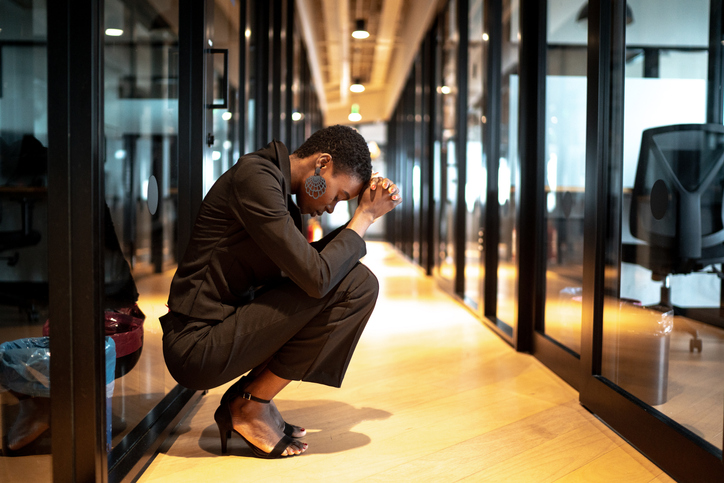By Crystal Mullens-Johnson, LCSW
Systemic racism, social injustice, oppression, voter suppression and police brutality have negatively impacted the mental health of people who are Black and other races for generations.
Trauma witnessed and experienced is very personal and unforgettable and can impact a person’s mental and physical health. Many Black parents are also fearful and stressed about raising their children in a country where Black lives are devalued.
And this problem does not just affect Black people — Latino, Asian and Pacific Islander and Native Americans also experience mental and physical health issues because of systemic and overt racism.
Post-Traumatic Stress Disorder
Post-Traumatic Stress Disorder (PTSD) is a mental health condition that is diagnosed in adults and children who have witnessed a traumatic experience (i.e. the death of a family member, abuse, witnessing a violent act, and a serious injury.)
PTSD requires a medical diagnosis by a psychiatrist or medical doctor after a physical and psychological exam. A self-report of the life-threatening event experienced and the response to the event provides insight about the client’s perception of the event, signs and symptoms experienced, and the duration of symptoms.
It is not uncommon for a person to not recognize they have PTSD and fail to get treatment. However, recognizing and seeking help for PTSD is vital to living a functional life.
One may struggle with self-managing symptoms of PTSD and experience impairments in life. Or you may struggle for months or years with emotional and psychological symptoms of PTSD that causes distress in daily life. PTSD symptoms include:
- Behavioral: irritability, agitation social isolation, hypervigilance, self-destructive behaviors, and hostility.
- Mood: loss of interest or pleasure in daily activities, loneliness, and guilt.
- Sleep: loss of sleep or nightmares.
- Intrusive thoughts.
- Psychological: flashbacks, fear, anxiety and mistrust.
Race-Based Traumatic Stress
Racism and discrimination can cause Race Based Traumatic Stress (RBTS), which is most commonly experienced by Black Americans and other ethnic minorities. It can come in the forms of race-based harassment, discrimination, race-based social exclusion or race-based injustice.
According to Psychiatric Times, “In 2001, the U.S. Surgeon General issued a report about the status of mental health with respect to racial and ethnic minority groups, which stated that ethnic and racial disparities were likely due to racism and discrimination. For trauma to be present, the reactions need to be associated with symptoms of intrusion, avoidance, and arousal.”
Exposure to racial trauma can spark the onset of behavioral and emotional symptoms, including sadness, hopelessness, fear, low self-confidence, avoidance, hypervigilance, anger, stress and emotional dysregulation (emotional responses that are poorly modulated and do not lie within the accepted range of emotive response).
Coping with Race-Based Traumatic Stress
No matter the age or socioeconomic status, it can be emotionally and psychologically stressful when encountering racism and discrimination for people of color. Understanding the concept of RBTS is vital to coping with it.
Here are some steps you can take:
- Acknowledge the effects of trauma.
- Recognize your triggers.
- Limit your expose to racism and oppression by disconnecting from social media and the news.
- Talk with a mental health professional.
- Celebrate your cultural norms and ideals.
- Identify when you are triggered and remove yourself from the environment by taking a time out.
- Join a cause and use your voice by being involved in social action.
- Develop boundaries with people who don’t respect you and teach your child boundaries.
- Challenge negative thoughts about yourself and realize you are worthy.
- Teach your child about their culture and nurture their self-confidence.
- Manage your emotions and teach your child to regulate their emotion if they are faced with racism.
- Use daily affirmations and mantras to manage your self-confidence.
Our mental health is essential
Mental health is important because it encompasses our emotional and psychological well-being. Your thoughts, feelings and emotions are impacted by your mental health. Mental health affects your response to stress, relationships, and your ability to overcome challenges. Managing your mental health and physical health is equally important; if you aren’t mentally healthy your physical health can be affected.
Our mental health is essential. Do not suffer in silence. If you have symptoms of PTSD, RBTS, or experience mental health challenges that interfere with your daily functioning, seek help. Undoubtedly, mental health stigma can discourage Blacks and other people from other oppressed racial groups from receiving mental health treatment.
Unfortunately, this stigma exists because of miseducation, a lack of understanding, misguided information that circulates in some communities and fear of people living with a mental illness. You can learn to cope with mental health problems by facing the fear of being stigmatized, sharing your traumatic experiences with a qualified professional, and making a personal decision to commit to change.
Labor Union leader William Dudley “Big Bill” Haywood said, “An injury to one is an injury to all.”
While we may feel that we are in survival mode and running on empty, there is hope. Employ the suggested coping skills to become a better you. Let’s strive together for social justice and equality for all.
 Crystal Mullen-Johnson, LCSW, is a Registered Play Therapist in Alabama with more than 16 years of experience in providing counseling services. Her Strive Counseling Services is a private practice, located in downtown Birmingham, Alabama, that offers therapeutic mental health services to children , adolescents, and adults.
Crystal Mullen-Johnson, LCSW, is a Registered Play Therapist in Alabama with more than 16 years of experience in providing counseling services. Her Strive Counseling Services is a private practice, located in downtown Birmingham, Alabama, that offers therapeutic mental health services to children , adolescents, and adults.
Mullen-Johnson is author of 21 Days Journal to Strive for a Healthier You (Palmetto Publishing). She is regularly featured as a mental health expert in print, radio, and television media and has a regular mental health column in the Birmingham Times Magazine.





